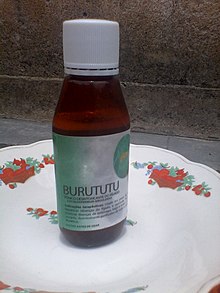
Borotutu is traditional medicine made from the African tree Cochlospermum angolense. It is widespread in parts of Angola, where it is known as mburututu in the Chokwe and Kimbundu languages.
Uses
Borututu bark is claimed to have hepatic healing properties and a general cleansing effect. Borotutu bark pills and herbal teas are sold in health stores. The bark showed activity against the rodent malaria parasite Plasmodium berghei in laboratory tests.
In Ghana, where the bark locally known as paajawu, it is added to Shea Butter during the boiling process for a vibrant yellow coloring.
References
- Videira C, Pedro JM, Vaz Nery S, Rastreio etnobotânico nas comunas de Caxito, Mabubas e Úcua (Província do Bengo) – resultados preliminares, Instituto Politécnico de Lisboa, 2010. PDF
- Presber W, Herrmann DK, Hegenscheid B (1991). "". Angew Parasitol (in German). 32 (1): 7–9. PMID 2039095.
External links
- "The hepatoprotective cytochrome P-450 enzyme inhibitor isolated from the Nigerian medicinal plant Cochlospermum planchonii is a zinc salt". Journal of Ethnopharmacology. 48: 89–97. doi:10.1016/0378-8741(95)01290-t.
| Medicinal herbs and fungi | |
|---|---|
| Herbs |
|
| Fungi | |
| Regional practices | |
| Related subjects | |
| List of plants used in herbalism | |